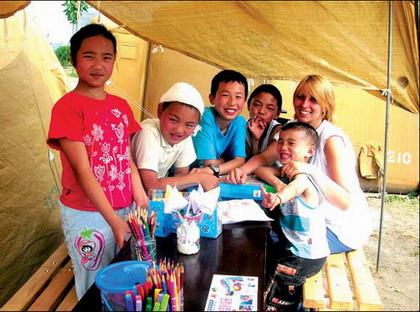They are from Russia really with love
By Huang Zhiling (China Daily)
Updated: 2008-05-28 08:08
Updated: 2008-05-28 08:08
PENGZHOU, Sichuan -- Students of Pengzhou Vocational School are fascinated with the 21 big inflatable tents pitched on their playground that is full of Russian medics in blue and green.
A 67-member Russian medical team set up the mobile hospital in Pengzhou, about 90 km from Sichuan's provincial capital of Chengdu, in just three hours a week ago.
Team leader Alexander Ivanus says the hospital is fully equipped and can offer medical treatment to any patient. This prevents precious time being wasted in transferring of patients and increases their chances of survival.
|
|
The hospital has departments of internal medicine, surgery, orthopedics, neurology, pediatrics and psychology, complete with ultrasonic and electrocardiogram machines.
Twenty patients, the first batch, were treated at the hospital just a day after it was started on May 20.
They included an 80-year-old woman who had suffered a cerebral concussion, and the doctors began operating on her in less than an hour. The surgery was successful.
The Russian doctors examine the patients as soon as they reach the hospital, and carry those needing urgent surgery to the operation table.
Valery Shabanov, deputy team leader, says the hospital has treated more than 500 quake victims and performed surgery on 50 people.
He admires the grit of the patients who did not even groan despite the unbearable pain they were suffering.
All but one of the team members are ethnic Russians. They are highly experienced, too, and participated in the tsunami relief work in 2004.
The only one who is not an ethnic Russian is 25-year-old Gan Junda.
Gan was born in Chongqing, part of Sichuan till a decade ago when it was made a municipality under central administration. He and his parents migrated to Moscow when he was six years old.
Now he is a neurologist with a hospital in the Russian capital. And since he is proficient in Russian and the Sichuan dialect both, he is one of the busiest members of the team.
Gan is all praise for his Russian colleagues who are ready to work round the clock to treat the patients.
But despite the seriousness of the doctors and the rest of the team, laughter can be heard in the hospital.
Olia Makarova, a young psychology counselor, can be seen playing with kids as one enters the children section.
These children are either patients or live nearby. She says an average of 20 children and adults seek her help each day. "I play and draw pictures with the children to divert their attention and mitigate their fear."
Liu Wencheng, a volunteer and interpreter for the team, says the Russian medics are good at psychological counseling.
The hair of a seven-year-old boy who had suffered intra-cranial hemorrhage needed to be shaved before he was operated upon. But he was too terrified, and didn't cooperate with the doctors at all.
"The doctors told him with a caring smile that they would give him the most fashionable haircut possible and that everyone would envy his hairstyle. That did the trick," says Liu, who works for a travel agency in Sanya, Hainan province.
Liu and 12 of his colleagues paid their own airfare to fly to Chengdu a day after the hospital was set up.
They then traveled to Pengzhou and have stayed back to help the Russians.
Shabanov says the Chinese people's behavior has overwhelmed him. Residents keep sending flowers to them, a laundry dry-cleans their clothes, and a farmer sends them fresh vegetables every day.
Asked how long the team would stay in Pengzhou, Shabanov says with a smile: "As long as we are needed."
|
||
|
||
|
|
|
|
